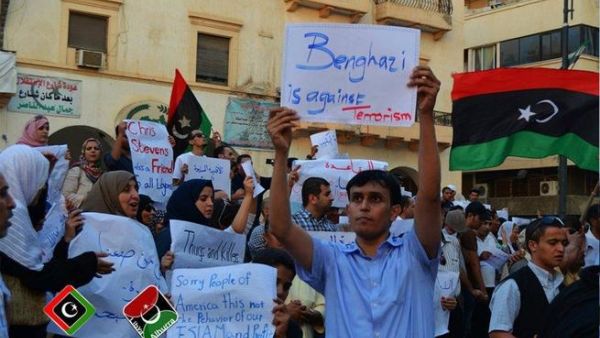Despite being neighbors, Egypt and Libya’s reaction to the US embassy deaths, announced yesterday, could not have been more different. In Cairo there were more clashes reported today and the Muslim Brotherhood put out a statement many viewed as anti-American.
By contrast, Libyans took to the streets of Benghazi in counter-protest and flooded Facebook with messages in support of the US. The attacks on the US embassies in Cairo and Benghazi on Tuesday night followed news of the release of a controversial anti-Islam movie about the Prophet Muhammad.
The amateurish looking film depicts the Prophet as a homosexual, pedophile and slave owner: all highly offensive to Muslims worldwide. In Libya, four US officials, including the popular ambassador Chris Stevens, were killed when protestors stormed the embassy. Ten Libyans were also reported dead.
The Cairo embassy attack did not end with any fatalities but 48 hours on the siege shows no sign of abating. Finally President Morsi spoke today from Brussels, to ask for calm. The newly elected Egyptian president said the movie had gone too far and seemed to be excusing the killing of US citizens:
“Prophet Muhammad and Islamic sanctities are red lines for all of us,” he said.
The delay in putting out a response has many questioning how seriously Morsi took the attacks on Washington’s base.
In stark contrast, the Libyan deputy prime minister was straight on his Twitter account as soon as reports emerged of US deaths on his watch. Dr. Mustafa Abushagur made no excuses for the violence, saying:
“I condemn these barbaric acts in the strongest possible terms. This is an attack on America, Libya and free people everywhere.” Dr. Abushagur has now been elected as the new prime minister of Libya.
Although the Egyptian president sent his condolences to the US for the death of their ambassador, he has been nowhere near as clear-cut in his condemnation of the bloodshed.
It is a sign of the times that Libyans, who have recently elected a liberal coalition of political parties, yesterday bombarded the streets of Benghazi with signs such as “Benghazi is against terrorism” and “Chris Stevens was a friend to all Libyans.” Worldwide the loss of this pro-revolutionary, and Libyan loving Ambassador was felt with counter-extremist protests set to continue today.
Egyptians on the other hand, have clearly had a different Arab Spring experience, electing a government that they hope will stand up to US influence even when that means American deaths on Middle Eastern soil.
Why do you think Libya and Egypt have reacted differently? Who is responsible for the deaths? Tell us what you think below.









